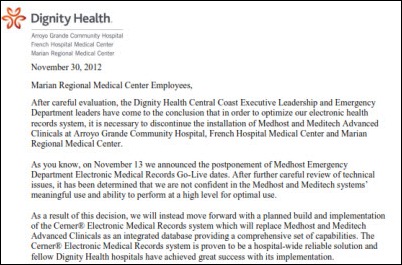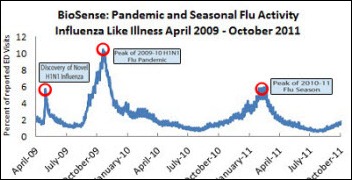The New Yorker cartoon of Readers Write articles.
Monday Morning Update 12/3/12
From NoNamesPls: “Re: MD Anderson. They will replace not only their in-house developed EMR, but also commercial systems for pharmacy, lab, RIS/PACS, and ADT/Scheduling. Epic and Cerner are the frontrunners.” Another reader forwarded me the internal e-mail from the deputy CIO and the CMIO, which says MDACC spends $20-$30 million per year on its homegrown ClinicStation but still can’t keep up with federal regulations. The RFP goes out in January. It’s interesting that the e-mail suggests that they’re happy with the patient benefits of their existing system, but will spend hundreds of millions of dollars to replace it for non-patient reasons. Somehow you have to wonder if that’s really a good thing.
From Upon Further Review: “Re: three hospitals of Dignity Health (formerly CHW). Scrapping their Meditech 6.0 and Medhost implementation that was supposed to start going live last week and moving to Cerner. Go-live required by January 1, 2014.” Above is part of Friday’s letter sent to employees by Chuck Cova, president and CEO of Marian Regional Medical Center, which says, “We are not confident in the Medhost and Meditech system’s meaningful use and ability to perform at a high level for optimal use.” It went down to the wire: Medhost was to supposed to be brought live starting November 26, but the project was delayed on November 13 and then killed on November 30.
DZA MD replied to my Time Capsule editorial from 2008 in which I suggested that patient encounters be recorded on video now that multimedia storage is cheap (security cameras are running everywhere, after all, and your encounters with Las Vegas card dealers are recorded in multi-angle splendor). Here’s what DZA MD had to say:
Imagine how well behaved everyone would suddenly be! Patients and caregivers. Both are in need of civility IMHO.
Though certainly not the first, I proposed this solution to patient care documentation to interested academics at my institution round the millennium. It was not taken seriously and was viscerally scary in a dot.gov sort of way, but the time has arrived. Some consequences (positive):
- Documentation. Real-time video and audio. Obvious. Supplement with dictated or keyed notes into the EMR, capturing decision-making and care coordination / consults. Even online research pertinent to the visit (can sarcoidosis cause GI symptoms?) could be incorporated into the record (browser history), supporting decision making and due diligence. These AVI files are completely portable without need for interface language.
- Billing. How about simply paying an hourly rate for time spent, like lawyers? Time stamps on audio and video, post-visit data entry and online patient care research would serve as indisputable evidence of billable time.
- Legal. ‘Nuff said. Patients who opt in to AV documentation assent to legal arbitration. And benefit from reduced insurance costs associated with this documentation product. Patients who opt out must use the traditional tort pathway, but are exposed to the added expense of that course of action.
- Patient education and self care. An electronic copy (edited or not) of the visit can be provided to the patient. Presumably the interaction involves patient education elements from the clinician.
- QA. NLP can sort through audio files for key words related to quality metrics. AV files can be used for clinician feedback for both physical exam skills as well as interpersonal behavioral skills.
- Cost. Memory is cheap. AVI files are portable, searchable, and easily indexed and archived. Insurers could develop pilot programs using this technology to study cost impacts in preparation for wide release if promising.
I hand-picked this week’s Spotify playlist with music sharing only one attribute: I like everything I included. On it: Pond, RPWL, The Killers, Band of Horses, Marina and the Diamonds, Turtle Giant, and a searing live version of “Little Wing” from Clapton/Winwood. Here’s a trivia throw-down: what movie (one of my favorites) opens with Tune #13 as buses drive by in the night? If you want to play along at home, I also created this empty playlist to which you can add your song du jour — I’ll listen to them and choose some for next week’s playlist (it’s like a clinical inbox for music referrals).
Welcome to new HIStalk Platinum Sponsor Fujifilm, which offers the Synapse product line (RIS, PACS, 3D suite, virtualization, managed services, and teleradiology RIS). The Web-based Synapse radiology management solution provides hospitals and outpatient imaging facilities such capabilities as integrated dictation, a referring physician portal, electronic dashboards, mammography reporting, peer review that meets ACR guidelines, and critical result notification, all included at no extra cost. Users can craft their own workflows via built-in tools for instant messaging, automated e-mail notification, and digital forms creation. They can also use drawable consent forms, inventory tracking, and real-time eligibility checking. The RIS integrates with every PACS on the market, including of course Synapse PACS. It even includes teleradiology capabilities. You can choose Synapse RIS as a turnkey system that includes software, hardware, hosting, system management, upgrades, and optional disaster recovery services and off-site archiving. Customers pay by exam volume rather than per user or per site, which makes it affordable for facilities ranging from small imaging centers to multi-facility enterprises. Thanks to Fujifilm for supporting HIStalk.
Here’s an overview of Fujifilm’s Synapse RIS that I found on YouTube.
Thanks to the following sponsors, new and renewing, that have recently supported HIStalk, HIStalk Connect, and HIStalk Practice. Click a logo for more information.
The vast majority of survey respondents believe that transcription is a commodity service differentiated primarily on price. New poll to your right: should the government require more upfront proof of attaining Meaningful Use before before sending payments?
Few people buy traditional software (i.e. PC programs in a box instead of apps in a Web store) these days, and those who do are rarely delighted. I’m happy to report an exception. I bought the just-released Dragon Naturally Speaking 12 and it’s amazing. The accuracy approaches 100 percent and it’s quite fast. I bought the premium version from Amazon for $126, which also includes the ability to transcribe pre-recorded dictation, sort of like Nuance’s eScription server-based speech recognition (the Home Version is only $50). You can speak at least three times faster than you can type, not to mention saving your wrists. I’ve used previous versions as well as the Windows 7 speech recognition and Siri and there’s no comparison. (Disclosure: Nuance is a sponsor and has offered me free copies several times, but I paid out of my own pocket so I wouldn’t feel bad about saying I hated DNS if that was the case). DNS 12 is one of the most amazing things I’ve ever seen run on a PC, although as critics always point out, you can’t use it with an EMR since that requires the more expensive medical version. But if you want to feel like Bill Shatner sprawling back in a chair on the Enterprise bridge and barking out orders for the computer to obey, you need it. It must be a miracle for people with handicaps who can’t use computers in traditional ways.
Scanadu, the 20-employee company whose tagline is “Sending your Smartphone to Med School,” announces that it will release three consumer tools by the end of 2013. The $150 Scanadu Scout is held to the temple and in less than 10 seconds, checks pulse, heart activity, temperature, and pulse oximetry and sends the results via Bluetooth to its smartphone app. Project ScanaFlo is a disposable cartridge that turns a smartphone into a urine analysis reader (pregnancy complications, gestational diabetes, kidney failure, or UTI). Project ScanaFlu is a saliva tester that detects cold symptoms by checking for strep, influenza, adenovirus,and RSV. Scanadu is best known for working on a tricorder-like health assessment device and these modules are the first components of it. Above is a Friday interview with the co-founder and CEO, who seems to be at a loss of how to explain medical principles to the sing-songy twenty-something interviewer who nods intently while saying “sort of “ and “you know” a lot while clearly not understanding most of what he’s saying.
It appears that Blackstone Group has become the frontrunner to acquire Allscripts, although the company is rumored to be holding out for more money than Blackstone thinks it’s worth. Shares dropped 11 percent Friday, having lost most of the gains that occurred after rumors of the company’s sale slipped out in late September. The other bidders were claimed to be Carlyle Group LP and TPG Capital Management LP. I don’t understand SEC rules, but this business of running newspaper stories quoting insiders about who’s making offers and at what price sure seems to open the door for cheating, like intentionally leaking out news that will move the share price up or down in a way that will benefit the leaker.
CareFusion announces that Children’s Hospitals and Clinics of Minnesota has gone live on wireless connectivity between its Alaris smart IV pumps and Cerner Millennium.
Health Management Associates warns investors that a “60 Minutes” report is expected to claim that the for-profit hospital operator’s contracted ED doctors were pressured to admit patients who didn’t need to be hospitalized. Both HMA and Community Health Systems have disclosed in SEC filings that several government agencies are following up on whistle-blower allegations by requesting admissions information. HMA says it thinks authorities want to know how more about its vendor-provided ED software and whether it was programmed to admit patients unnecessarily. Tenet Healthcare had accused competitor CHS in early 2011 of using ProMed Clinical Systems software to boost its admissions in a lawsuit, but a judge dismissed the claim. HMA is also a user of ProMed’s Web-based vEDIS software, which is ONC-ATCB certified. I seriously doubt that ProMed makes admission decisions that the ED docs can’t override, so if there’s a smoking gun, I’d expect to find it in internal e-mails, meeting minutes, or in interviews conducted with the actual ED docs.
Kansas Health Information Network becomes the first HIE to connect directly to the CDC’s BioSense outbreak tracker, allowing hospitals to quickly share information about threats and report them to CDC to investigate possible outbreaks.
Advanced Data Processing announces that it has fired an employee who admitted stealing data from an ambulance billing system it runs and selling it to a criminal group suspected of using the information to file fraudulent tax returns to collect refunds. The information came from Cape Fear Valley Hospital Health System (NC). The same scam has led to the arrest of three people in Florida, at least one of them an employee of Florida Hospital Tampa, who used hospital patient billing information to collect $1.5 million in IRS tax refunds.
Why can’t American healthcare strikers be this much fun? Public health workers in Spain protest government spending cuts and healthcare privatization by performing a flash mob dance outside La Paz Hospital in Madrid.
GE CEO Jeff Immelt says, “The next holy grail is about decision support and analytics.”
A rare Weird News Andy weekend update: in France, a man is awarded $250,000 in his lawsuit against GSK, maker of the Parkinson’s drug that he claims caused him to become addicted to gay sex and gambling. The suggestion that gay sex is a shameful addiction that requires compensation is kind of insulting, but apparently the jury bought it.
Bizarre: a pharmacist pleads guilty to planting mercury in areas of Albany Medical Center Hospital (NY) in the hopes that the ensuing panic would drive patients away. Police searching the home of the man, who was upset that the had hospital billed him for treatment, found child pornography, Nazi memorabilia, and a stockpile of guns and ammunition.
Also bizarre: a Washington veterinarian and aspiring EMT is charged with animal abuse after former employees claim he punched and choked animals under his care. He had already admitted to stealing and using drugs from his practice. The owner of one animal that was allegedly mistreated summarized, “Well, I wouldn’t want him to be my first responder. Golly.” The doctor’s Facebook blames disgruntled former employees and lawyers trying to change the state’s veterinary malpractice laws, which limit plaintiffs to recovering the “market value” of their animal with no pain and suffering award available for the lawyers to skim their 33 percent of.
Vince covers the fascinating HIS-tory of CPSI this time around, getting some help from Troy Rosser, SVP of sales there.
Contacts
Mr. H, Inga, Dr. Jayne, Dr. Gregg.
More news: HIStalk Practice, HIStalk Connect.




















Maine Medical Center in Portland Maine (637 beds) went live on Epic Enterprise today, December 1
Congratulations Barry! As a CIO you should be very proud of this achievement as should everyone else that was involved at Maine Medical Center.
November 1st Dave Peterson stepped into Boston Medical Center’s CIO role. Prior, Dave held multiple roles at Catholic Health Initiatives, including CTO over the 54 hospitals and Regional CIO over a six hospital region. Dave will co-lead the IT initiatives at BMC along with newly placed Dr. Eric Poon, the former CMIO of Brigham & Women’s at Partners Healthcare. An impressive team is dialed up to lead BMC through the planned Epic deployment.
“Why can’t American healthcare strikers be this much fun?”
Because within an hour every news channel in the US would be screaming “these physicians and nurses would rather dance than save lives.”
Replacing MD Anderson’s ClinicStation and other ancillary systems with a single system from Epic or Cerner sounds like, on the surface, a no-brainer. However, whoever wins the contract faces two big risks – 1) MD Anderson is very different from other hospitals due to it being a cancer research center and 2) ClinicStation was designed to the specifications of the organization. Physicians expect and ClinicStation delivers very specific functionality that may be difficult for a Cerner or Epic to provide.
This will be a great test of the ability of the winning vendor to provide a customized solution that matches ClinicStation’s features and functionality. This will be a challenge for either vendor.
Success or failure will be well publicized in the HIT community.
I hope whoever is providing HISTalk with inside information will continue to provide unbiased updates as the project unfolds. It should provide good reading in the years ahead.
I’m curious – are these events related to Lynn’s departure earlier this year?
MD Anderson is living proof of how meaningfully useless and costly the MU gig has become. Instead of devoting their resources to taking good care of the patients, D Anderson now must create disruption at great real and derivative cost to take good care of the US Government.
Is there not someone at MD Anderson who has the balls to stand up to the Congress and HHS?
The MD Anderson thing got me thinking: how difficult was Meaningful Use Phase 1 for hospitals and clinics that already had a big commercial system (e.g., Epic or Cerner)? It certainly has been a disruption for hospitals and clinics that had no EMR or a very limited EMR. But for the Cleveland Clinics and Palo Alto Medical Foundations of the nation, was it difficult or fairly routine?
Not to minimize the impact to MD Anderson, but if their current system couldn’t handle the requirements even with a $30 milion yearly investment I wonder if it needed replacing anyway.
Re: DNS: In my experience, outpatient providers have used the non-medical version of Dragon very successfully with their EMRs.
Re: WNA story of Parkinson’s meds lawsuit. The links to gambling and hypersexuality are well documented. My uncle, recently deceased from Parkinsons’s, left thousands of dollars at the casinos while on his meds, though fortunately did not suffer the other side effect.
To back up with Been There is saying, RadioLab did a story on a West Virginia woman who was overcome with gambling addiction after starting her Parkinson’s treatment. Listen here: http://www.radiolab.org/2009/jun/15/seeking-patterns/
More good CPSI stuff – thanks! Great story.
Well Vitera is up to their usual antics … More layoffs and in serious numbers today. This is getting old and who would want to continue to work there while wondering if it will be me today ?? And Happy Holidays to you too Matt Hawkins !